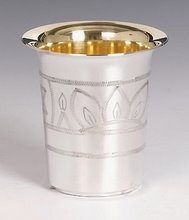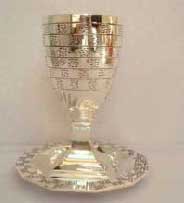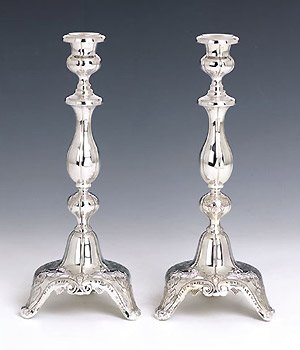 (s5760-23/ 10 Adar I 5760)
(s5760-23/ 10 Adar I 5760)“Wow! This is exactly the opportunity I’ve been waiting for!” said Reb Naftali of Rofshitz, one of the leading disciples of the Seer of Lublin.
THE ONION PLOT
Blizzards and storm winds had pounded Lublin and the surrounding countryside for several weeks. The roads were piled so high with snow that no one was able to go anywhere. This meant that the farmers weren't able to reach the city with their produce and food supplies were dwindling rapidly.
Many items were completely lacking, such as onions. There weren't even any onions to use in the tasty foods prepared in honor of Shabbat. This fact constituted a near tragedy, because in Lublin, the mixture of chopped eggs and onions, known in Yiddish as eiyr-un-tzibl, was considered a nearly indispensable ingredient of the holy day. The Jews of Lublin could remember occasions when there was no meat, or no fish, but whoever heard of being without onions?
The household of the famous tzadik, the Seer of Lublin, was particularly distraught. After all, Chasidic tradition attaches great significance to this humble dish. They tried to secure some onions by every means they could think of, but to no avail. Someone even managed to plod his way through the snowdrifts to a few of the local farmers, but they didn't have any onions either.
On Friday morning, one of the leading disciples of the Seer, Rabbi Naftali of Rofshitz, rose early as usual to make his way to the Rebbe's shul and pour out his heart in prayer to the Creator. On his way home afterwards he passed through the marketplace, where he unexpectedly came upon a peasant farmer with a sack filled with onions!
"Wow!" said Reb Naftoli to himself, struck by a bold idea. "This is exactly the opportunity I've been waiting for! Baruch HaShem." He approached the gentile and offered to buy the entire sack. The farmer knew very well the value of his precious merchandise and had been looking forward to making a tidy profit. He wasn't going to compromise now. No wholesale discounts! He stated an outrageously high price. To his great surprise, R. Naftoli instantly agreed and handed him the money.
But that wasn't the end of the surprises. "I'd like to buy your fur coat and hat too," the Rofshitzer added. The farmer couldn't believe his ears. Astonished, he refused. How could he possibly return home in the freezing cold without his coat and hat? But the thick wad of bills in his customer's outthrust hand argued persuasively, and the second deal was also quickly struck. Reb Naftoli strode home with his sack of onions and unusual new items of apparel.
* * *
Later that day, a farmer appeared outside the Seer's door. He was clothed in furs, peasant-style, with a huge hat covering his forehead and upper face and boots covered with mud. In the language and intonation of a gentile farmer he called out, "Onions! Onions for sale!"
Chasidim came pouring from every direction. Everyone wanted onions in honor of the holy Shabbat. They crowded around the onion-seller, attempting to bargain with him. He refused to budge from his price. Then, suddenly, he announced that he was stopping for the day. No more onions!
The chasidim pleaded with him. "But we still have to get some for the Rebbe. He is a great, holy man. Blessings will shower upon you, if only you will allow us to buy onions for him."
"If he is as special as you say, I'll do it," rejoined the farmer, "but only if I can sell them to the holy man directly, in person, face-to-face."
The chasidim were shaken. How could they bring such an unrefined character to the Rebbe? After a few moments of confusion, they realized they had no choice. A solemn delegation led the onion-laden farmer to the Seer's house.
When they came in, the Seer was busy polishing his unique kiddush cup, as he did every Friday before Shabbat. This was an extraordinary chalice, exquisitely crafted of pure gold, with intricate engravings depicting famous sites in the Holy Land, such as the Western Wall, the Tower of David, and the Mount of Olives.
Many rumors surrounded this kiddush cup and its history. It was said that the Seer had inherited it from one of the great chasidic masters of the previous generation, and whoever was privileged to make a blessing over its contents and drink from it benefited infinitely. Not that this merit was easy to come by. The Seer did not allow anyone else to use it or even touch it. The whole week it stood in a locked cabinet until Friday, when he would work on it until it glistened and sparkled on the white Shabbat tablecloth.
When his chassidim brought in the gentile with his sack, the Seer understood the reason at once. "How much do you want for your onions?" he queried the farmer.
"One moment. Not so fast," the farmer replied coarsely, holding up his hand as if to ward off the Rebbe's offer. "I'm frozen stiff. I need a proper drink to warm me up."
It was clear that such a person didn't have in mind a cup of tea. The Seer instructed his attendant to serve the man some whisky and a brimming shot glass was quickly set down in front of the farmer.
"That's all?" cried out the farmer, as if insulted. Just this little cup?"
"Give him the whole bottle and let him do as he likes," said the Rebbe, turning away.
Now the onion seller seemed mortally offended. "What! You think I'm a drunkard?" he shouted angrily. "I'll show you! I'll go home. I won't sell you anything!" He tied up the sack and fastened his garments, as if preparing to leave.
The chasidim hurriedly attempted to soothe him, anxiously muttering words of appeasement. Finally he calmed down. Then he smirked. "I tell you what," he offered. I'll sell you my onions if, and only if, you fill this goblet with whisky for me to drink." He pointed at the Rebbe's golden cup shining on the table.
The chasidim drew back, aghast. From this holy kiddush cup which no one dared touch except the tzadik, this uncircumcised drunken peasant should imbibe his crude booze? They offered him other cups and glasses, bigger ones, singly and in combination, but he was stubborn. "Only from this one, like I told you. Otherwise I go home."
They tried again to dissuade him, but nothing worked. He simply refused to budge. With trembling hands and heavy heart, the Seer himself filled the precious vessel with the coarse fluid and, with a helpless shrug, presented it to the farmer. The latter lifted it with his right hand, squeezed his eyes shut, and with great concentration and intensity called out, "Boruch atah...shehakol neyeh bidvaro."
Everyone was shocked speechless. Only the Seer, after a quick stare, realized what had taken place. A broad smile spread across his face. "L'chaim, Reb Naftali! You are so clever; it must be that you deserve to drink from this cup. L'chaim u'livracha! - May it be for life and for blessing."
[Translated and freely adapted by Yrachmiel Tilles (and first published in Kfar Chabad Magazine - English) from Sichat HaShavua #74.]
Biographical note:
Rabbi Yaakov Yitzchok Horowitz (1745 - 1815), known as 'the Seer of Lublin', was the successor to R. Elimelech of Lizensk (1717-1787), and a major personality in the spread of the chassidic movement throughout Poland.
Rabbi Naftali of Ropshitz (6 Sivan 1760 [the same day as the Besht's passing!] -11 Iyar 1827) became the rebbe of many thousands of chassidim. He was noted for his sharp wit and humor and his elusive shining aphorisms. Some of his teachings are collected in his works, Zera Kodesh, Ayalah Sheluchah, and Imrei Shefer. Many stories about him appear in the book, Ohel Naftoli.
For more Chassidic Stories




No comments:
Post a Comment